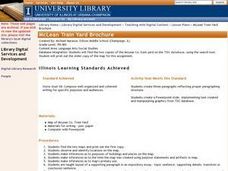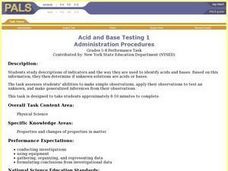Curated OER
Geometric Probablitiy: Spinners and Dartboards
Sstudents explore and analyze the properties of geometric areas. In this geometry lesson, sstudents use technology to simulate spinners and dartboards in order to fing areas of circles and sectors of circles and compare and...
Curated OER
Arctic cleanup
Ninth graders examine pollution problems and how it affects the community. In this arctic cleanup lesson students study ocean currents and how they affect pollution.
Curated OER
Introduction to Native Americans Thematic Unit
Students consider different cultural viewpoints. In this Native American history lesson, students examine artifacts and then conduct research on selected Native American tribes.
Curated OER
What are the Odds
Learners predict the-outcome of an event. In this algebra lesson, students compare and contrast the probability of an event occurring. They calculate the odds of a simple event and make estimation.
Curated OER
What Are The Chances
Students calculate the probability of an event occurring. In this probability lesson, students differentiate between independent, dependent or compound events. They find the range of the data.
Curated OER
Pythagorean Theorem: Triangles and Their Sides
Students investigate triangles and their relationship to each other. In this geometry lesson, students solve right triangles using the properties of the Pythagorean Theorem. They differentiate between right, acute, straight and oblique...
Curated OER
Build and Test Your Car Continued
Learners create and build cars to race in class. In this physics lesson, students calculate the speed using distance and time information. They evaluate their design and make adjustments when needed.
Curated OER
Using Newsprint as a UV Detector
Students investigate the effects of UV radiation. In this earth science lesson, students explain how the time of day relate to UV abundance on Earth. They determine if weather affects the amount of UV that Earth receives.
Curated OER
Feed Your Cells
Young scholars examine and research the human digestive system and what happens to the food we eat. They read the article, The Passage of Food, participate in an experiment with crackers, and write a paragraph summarizing the function of...
Curated OER
Insect Classification
Young scholars compare and contrast the visible structures of three insects based on photographs. They differentiate characteristics of crane flies, ants, and wasps then create a simple classification system.
Curated OER
The Water Cycle
Fifth graders review and discuss, "The Water Cycle" and its key elements of evaporation, condensation and precipitation. They create a terrarium in groups to connect concepts of The Water Cycle and to view precipitation, condensation,...
Curated OER
It's in the Garbage
Students analyze how studying garbage relates to methods of archaeology. They examine garbage to determine things about their culture and relate that to prehistoric peoples.
Curated OER
Utah Archaeology
Learners use Play-dough explore different types of fossils and examine how fossils are evidences of past life.
Curated OER
McLean Train Yard
Students conduct online research and incorporate graphics and maps into a Powerpoint presentation that details life at the McLean train yard in its heyday.
Curated OER
Probability: Playing with Fire
Students use probability to determine how likely it is for each tree in a small forest to catch on fire.
Curated OER
Rock Identification Lab
Eighth graders compare and contrast the three different types of rock. In this earth science instructional activity, 8th graders classify rock samples according to their correct rock type. They design their own data collection table.
Curated OER
The Science Of Mummies
High schoolers explore how new advancements in technology can lead to advancements in scientific knowledge, and specifically how new technologies are advancing the study of mummies.
Curated OER
Cooler in the Shadows
Young scholars explore how the amount of sunlight and heat change in areas that are shaded.
Curated OER
Acid and Base Testing
Students study descriptions of indicators and the way they are used to identify acids and bases. They use this information to determine if unknown solutions are acids or bases.
Curated OER
Technology and the Science of Mummies
Students explore how new advancements in technology can lead to advancements in scientific knowledge. They research and discuss how new technologies are advancing the study of mummies.
Curated OER
Extracting Meaning From What We See
Students recognize that all cultures have the same needs that they try to satisfy in ways that their predecessors found effective in their particular environments. Students discover how and why cultures change their customs.
Curated OER
Sample This
Students gain a greater understanding of how statistical samples are conducted by taking polls of specific populations. These polls be expressed in graphs, which be compared with the same questions asked of other populations.
Curated OER
Japanese Objects as Cultural Artifacts: A Model Lesson Using Textiles
Learners complete a unit on the cultural significance of textiles in the Japanese culturre. They analyze cotton, line, silk, and wool fabrics, examine various fabric creation and decoration techniques, select an object and write a...
Other popular searches
- Inference and Observation
- Observation Inference Lab
- Observation Inference Demo
- Inference Observation
- Observation Inference Science

























